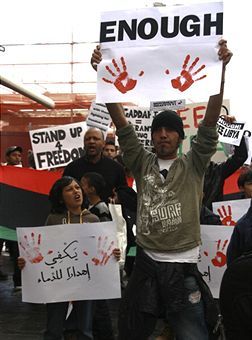 After a week of hesitation and well-publicised problems evacuating British citizens from Libya, the government has led the international community’s response to the crisis. The decision to move HMS Cumberland into position was astute, as was the authorisation to rescue the people stranded in the dessert. At the UN, British diplomats have been drafting most of the key resolutions and now David Cameron has out-hawked everyone by saying he’d be willing to contemplate a no-fly zone.
After a week of hesitation and well-publicised problems evacuating British citizens from Libya, the government has led the international community’s response to the crisis. The decision to move HMS Cumberland into position was astute, as was the authorisation to rescue the people stranded in the dessert. At the UN, British diplomats have been drafting most of the key resolutions and now David Cameron has out-hawked everyone by saying he’d be willing to contemplate a no-fly zone.
US lawmakers have asked the Obama administration why they have not been as swift as the UK. As a Bosnian-born friend of mine said last night: “If only David Cameron and William Hague were around in 1992, so many of my friends would have been alive today!”
But the crisis is now entering an even more difficult phase and the government needs a three-pronged strategy. First, it needs to act to remove Colonel Gaddafi by supporting the opposition militarily. Given the likelihood of a drawn-out stalemate and Gaddafi’s record of terror, the UK cannot afford his survival; it would cost British lives and endanger Tunisia’s progress. I make the case in greater detail here.
Second, as the Libyan crisis evolved, attention moved away from Tunisia, which is still struggling. Foreign Secretary William Hague should appoint a temporary regional envoy who can oversee relations with the region on his behalf. A sort of resident minister, as existed during World War II.
Third, the government must initiate a country-by-country “freedom review”, looking at how it can support reform across Africa. On the day that DfiD has launched the results of its aid review, looking for places where UK assistance is most effective, it must also look at ways to promote transparency and reform. Supplying the people of Rwanda makes little sense if President Kagame denies them basic freedoms. Working with Ethiopian government is fine, but let’s not find ourselves in a Tunisia-style situation where we back a leader who does well in the fight against poverty and tells us that he is reforming as much as he can, only for a pro-democracy to break out and embarrass us.






Comments